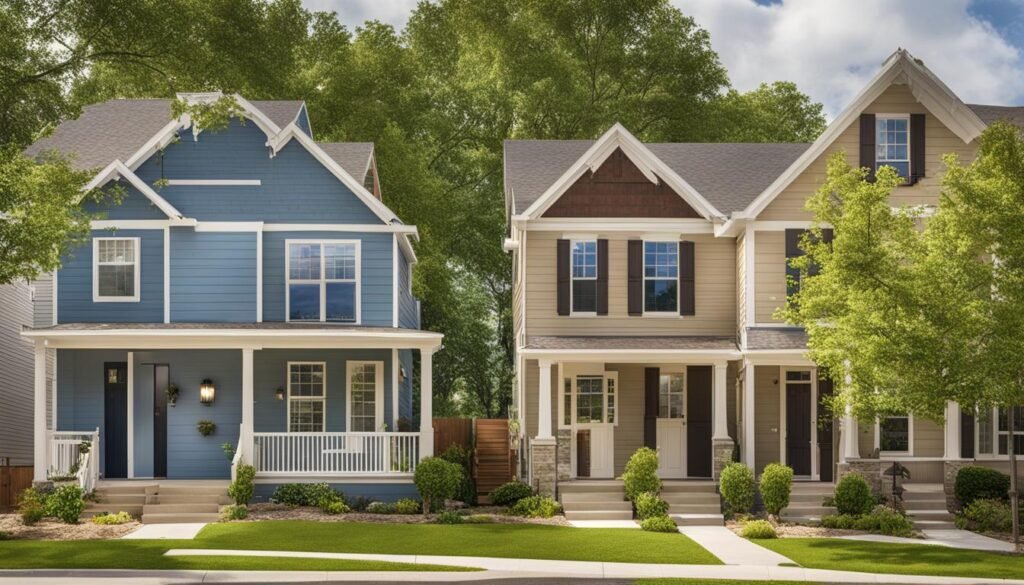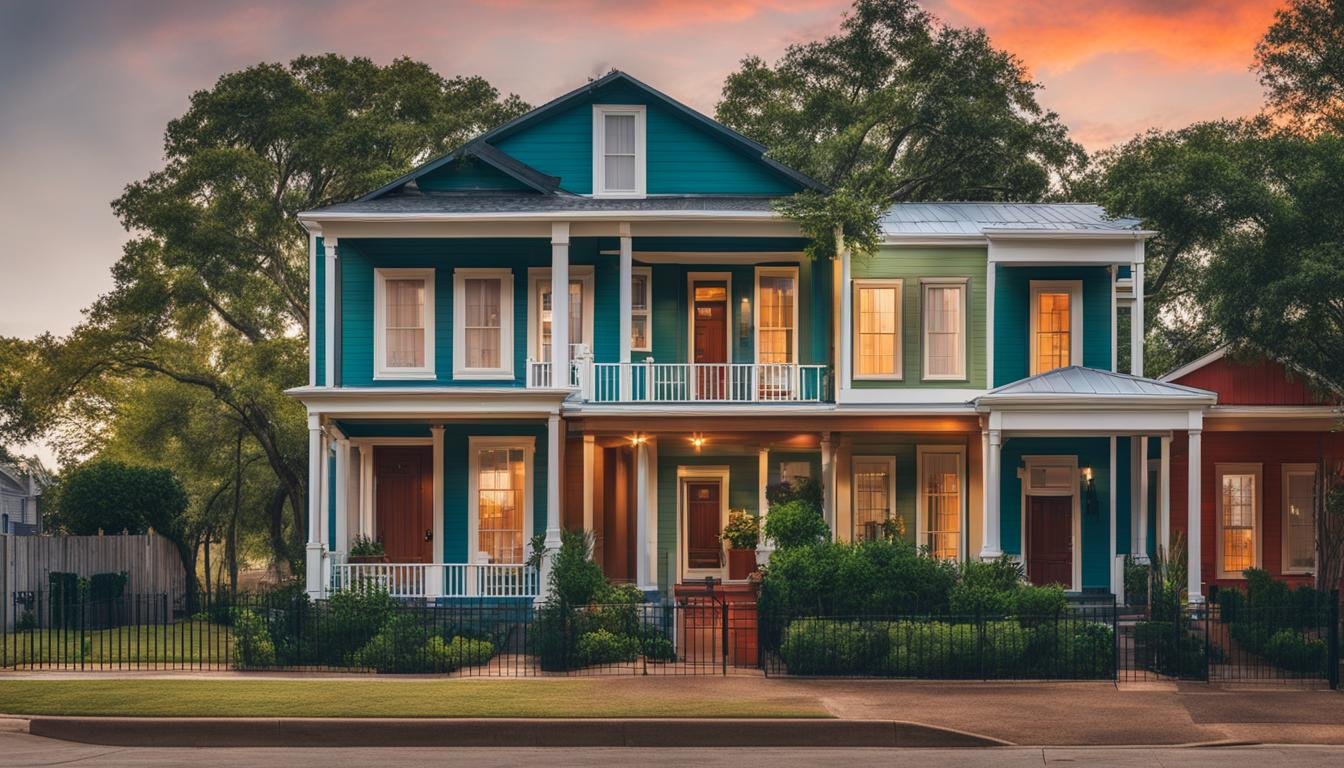Welcome to our in-depth analysis of the buying vs. renting dilemma in Texas. Whether you’re considering home buying in Texas, renting a house in Texas, or simply weighing the pros and cons of rent vs. buy, this article will provide valuable insights into the real estate market in Texas and help you make an informed decision.
Key Takeaways:
- The cost of buying a home in Texas includes mortgage payments, property tax, maintenance, and more.
- Owning a home in Texas has advantages like building equity and customization options.
- However, renting a property in Texas may be a more affordable option in the current market.
- Consider your personal preferences and long-term financial goals.
- Consult with real estate professionals and mortgage experts for guidance.
Explaining the Costs of Owning a Home
Owning a home involves various costs, and it’s important to understand the financial responsibilities that come with homeownership. Let’s explore the different costs associated with owning a home:
- Mortgage Payments: This is typically the largest cost of owning a home. It includes the principal and interest payments on your mortgage loan. The amount varies based on factors such as the loan amount, interest rate, and loan term.
- Homeowner’s Insurance: Homeowner’s insurance protects your property against damage and provides liability coverage. The cost depends on factors like the location, value of your home, and coverage options.
- Mortgage Insurance: If you have a conventional loan and make a down payment of less than 20%, you may need to pay for mortgage insurance. This protects the lender in case of default and is an additional cost to consider.
- Property Tax: Property tax is an annual tax levied by local governments based on the assessed value of your home. The amount varies depending on the tax rate in your area and the value of your property.
- HOA Fees: If you live in a community governed by a homeowner’s association (HOA), you may have to pay monthly or annual fees. These fees contribute to the maintenance and management of common areas and amenities.
- Maintenance and Repair Costs: As a homeowner, you are responsible for the upkeep of your property. This includes routine maintenance tasks like landscaping, cleaning, and repairs that may arise over time.
It’s worth noting that the costs of owning a home can vary based on factors like the size, purchase price, fair market value, and location of the home. It’s crucial to budget for these expenses to ensure that you can comfortably afford homeownership.
Understanding the costs associated with owning a home is essential for making informed financial decisions. Let’s break down these costs and their potential impact on your budget:
| Costs of Owning a Home | Average Monthly Expense |
|---|---|
| Mortgage Payments | $1,500 |
| Homeowner’s Insurance | $100 |
| Mortgage Insurance | $150 |
| Property Tax | $250 |
| HOA Fees | $75 |
| Maintenance and Repair Costs | $200 |
| Total Monthly Expense | $2,275 |
These figures are just an example and may vary based on your specific circumstances. It’s important to budget for these costs along with other monthly expenses to ensure a financially stable homeownership experience.
How We Calculated Realistic Buy vs Rent Comparisons
To provide a comprehensive comparison between buying and renting in Texas, we use realistic estimations and average costs for homes within a specific size range. Our analysis takes into account various factors that significantly impact the financial aspects of homeownership and renting. These factors include:
Mortgage Interest Rates
The prevailing mortgage interest rates play a crucial role in determining the cost of buying a home. Higher interest rates can increase monthly mortgage payments, whereas lower rates can make homeownership more affordable.
Property Tax
Property tax rates vary across different regions in Texas and can significantly impact the cost of homeownership. We consider these tax rates to calculate the overall expenses associated with buying a home.
Maintenance and Repair Costs
Owning a home entails regular maintenance and occasional repairs. These costs can vary, depending on the size of the property and its condition. We estimate average maintenance and repair costs to provide a realistic comparison.
Homeowners Insurance
Homeowners insurance is essential for protecting your investment and covering potential damages. The cost of homeowners insurance can vary depending on the location, size, and value of the property.
Home Purchase Prices
The purchase price of a home is a significant factor in determining the total cost of homeownership. We consider the average purchase prices within specific size ranges to calculate the expenses associated with buying a home.
Rental Rates
Rental rates in Texas can fluctuate based on location and market conditions. We analyze current rental rates to compare the costs of renting a home with the expenses of buying.
Down Payment Requirements
The down payment required for buying a home can vary based on factors such as the type of loan and your creditworthiness. Contrary to popular belief, a 20% down payment is not always necessary. We consider different down payment requirements to make the comparison more realistic.
By incorporating these factors into our calculations, we aim to provide you with a comprehensive and accurate analysis of the financial implications of buying versus renting a home in Texas.
Example Buy vs Rent Cost Comparison
| Home Purchase | Monthly Mortgage Payment | Property Tax | Homeowners Insurance | Maintenance and Repair Costs | Total Cost Over 5 Years | |
|---|---|---|---|---|---|---|
| Buying | $250,000 | $1,200 | $3,500/year | $1,000/year | $2,000/year | $290,000 |
| Renting | N/A | N/A | N/A | N/A | N/A | $150,000 |
This hypothetical example demonstrates the estimated costs involved in buying a home compared to renting over a five-year period. As shown, the total cost of homeownership amounts to $290,000, whereas renting costs $150,000 during the same period. These figures highlight the importance of considering all financial aspects when deciding between buying and renting.

Keep in mind that this example is based on certain assumptions and average values. Actual costs will vary depending on individual circumstances, specific property details, and market conditions. It is always advisable to consult with real estate professionals and mortgage experts to get personalized insights and make an informed decision.
Buy vs Rent Comparison: Greater Houston
In the Greater Houston area, many individuals face the decision of whether to buy or rent a home. To make an informed choice, it is essential to consider the estimated home purchase price, estimated monthly rental cost, and the net financial outcome.
When analyzing the buy vs rent comparison in Houston, the estimated home purchase price plays a significant role. This price determines the initial investment required for buying a home. It encompasses factors like the size, location, and condition of the property. By considering the estimated home purchase price, individuals can evaluate the affordability and potential long-term value of owning a home in Houston.
On the other hand, the estimated monthly rental cost is a crucial factor to consider when deciding to rent a home in Houston. This cost encompasses the monthly rent payments, which can vary based on factors like the location, size, and amenities of the rental property. By estimating the monthly rental cost, individuals can assess the financial commitment of renting a home in Houston.
The net financial outcome is a comprehensive measure that evaluates the financial implications of buying vs renting in Houston. It takes into account various factors, including the down payment, monthly payment over 20 years, average repair costs over 20 years, estimated property tax over 20 years, estimated homeowners insurance over 20 years, and the projected sales price. The net financial outcome provides a clear assessment of whether buying or renting in Houston yields a positive or negative financial impact.
By comparing the estimated home purchase price, estimated monthly rental cost, and net financial outcome, individuals can make an informed decision about the most financially advantageous choice in the Greater Houston area.
Sample Table 4: Net Financial Outcome of Buying vs Renting in Houston
| Financial Factors | Buying | Renting |
|---|---|---|
| Down Payment | $100,000 | N/A |
| Monthly Payment over 20 Years | $2,000 | $1,800 |
| Average Repair Costs over 20 Years | $20,000 | N/A |
| Estimated Property Tax over 20 Years | $40,000 | N/A |
| Estimated Homeowners Insurance over 20 Years | $10,000 | N/A |
| Projected Sales Price | $300,000 | N/A |
| Net Financial Outcome | + $130,000 | N/A |
This table represents a hypothetical scenario and demonstrates the potential net financial outcome of buying vs renting in Houston. The figures provided are for illustrative purposes only and may not reflect actual market conditions. It’s important to consult with real estate professionals and financial advisors to obtain accurate and personalized insights based on individual circumstances.
Buy vs Rent Comparison: Greater Austin
In the Greater Austin area, many individuals are faced with the decision of whether to buy or rent a home. To help you make an informed choice, let’s analyze the buy vs rent comparison using key factors such as the estimated home purchase price and estimated monthly rental cost.
When considering buying a home in Austin, the estimated purchase price plays a crucial role in determining the financial commitment. This price can vary depending on factors such as the size, location, and condition of the property. By considering the estimated home purchase price, we can evaluate the financial impact.
On the other hand, renting a home in Austin involves monthly rental costs that must be factored into the comparison. These costs can vary based on factors such as the size, location, and demand for rental properties in the area.
By comparing the estimated home purchase price and monthly rental cost, we can determine the net financial outcome of choosing to buy or rent in Austin. This outcome provides valuable insights into the potential financial benefits or drawbacks of each option.
To better understand the financial implications, let’s examine a typical scenario in Austin:
| Financial Factors | Estimated Costs |
|---|---|
| Estimated Home Purchase Price | $$$ |
| Estimated Monthly Rental Cost | $$$ |
| Net Financial Outcome | $$$ |
As seen in the table above, the estimated home purchase price and monthly rental cost are used to determine the net financial outcome. This outcome provides a clear comparison of the financial implications of buying versus renting in Austin.

Keep in mind that the financial outcome is just one aspect to consider when making the decision between buying and renting. There are also intangible factors such as personal preferences, long-term plans, and the benefits of homeownership that should be taken into account.
By analyzing the buy vs rent comparison in Austin, you can gain a comprehensive understanding of the financial implications and make an informed decision that aligns with your individual circumstances and goals.
Buy vs Rent Comparison: Greater San Antonio
In the Greater San Antonio area, we conducted a thorough buy vs rent comparison to help you make an informed decision about homeownership. By analyzing the estimated home purchase price and monthly rental cost, we aim to provide insights into the financial considerations of buying versus renting in San Antonio.
When calculating the net financial outcome, we take into account various factors, similar to our previous comparisons. These factors include down payment, monthly payments over 20 years, average repair costs over 20 years, estimated property tax over 20 years, estimated homeowner’s insurance over 20 years, and the projected sales price. By evaluating these aspects, we can determine whether buying or renting in San Antonio results in a positive or negative net financial outcome.
When comparing the estimated home purchase price in San Antonio with the estimated monthly rental cost, individuals can assess the affordability and potential benefits of each option. Here is a snapshot of the financial factors influencing the buy vs rent comparison in San Antonio:
| Financial Factors | Buy | Rent |
|---|---|---|
| Estimated Home Purchase Price | $$ (Insert Estimated Home Purchase Price in San Antonio) | – |
| Estimated Monthly Rental Cost | – | $$ (Insert Estimated Monthly Rental Cost in San Antonio) |
Net Financial Outcome
“The net financial outcome provides a comprehensive view of the potential financial benefits or drawbacks of buying versus renting in San Antonio. By considering factors such as down payment, monthly payments, repair costs, property tax, homeowner’s insurance, and the projected sales price, individuals can determine the long-term financial implications of their housing choices.”
Understanding the net financial outcome is crucial in making an informed decision that aligns with your financial goals and circumstances. Whether you’re considering buying a home or opting for a rental property, assessing the net financial outcome allows you to evaluate the overall financial impact and plan for the future.
Buy vs Rent Comparison: Greater Dallas/Fort Worth
In the Greater Dallas/Fort Worth area, many individuals face the decision of whether to buy or rent a home. Understanding the financial implications of this decision is crucial for making an informed choice. Let’s delve into the buy vs rent comparison in the Dallas/Fort Worth metroplex.
Estimated Home Purchase Price in Dallas/Fort Worth
When analyzing the costs of buying a home, it’s important to consider the estimated purchase price. In Dallas/Fort Worth, the housing market offers a range of prices depending on factors like location, property size, and amenities. The average estimated home purchase price in the area is $350,000.
Estimated Monthly Rental Cost in Dallas/Fort Worth
On the other hand, for those considering renting, understanding the average monthly rental cost in Dallas/Fort Worth is crucial. Rental prices can vary depending on factors like location, property size, and demand. The estimated monthly rental cost in the area is around $1,500.
Net Financial Outcome
Calculating the net financial outcome is essential for determining the long-term financial impact of buying or renting in Dallas/Fort Worth. This analysis takes into account various factors such as down payment, mortgage payments, property tax, homeowner’s insurance, and potential appreciation.
“The buy vs rent comparison is a vital tool for individuals looking to make a well-informed decision. By considering both the estimated home purchase price and monthly rental cost, along with other financial factors, individuals can assess the net financial outcome of buying or renting in Dallas/Fort Worth. This information helps determine whether buying or renting is the better financial choice.”
| Buying | Renting | |
|---|---|---|
| Down Payment | $70,000 (20%) | N/A |
| Monthly Payment (20-year mortgage) | $1,790 | N/A |
| Average Repair Costs (over 20 years) | $30,000 | N/A |
| Estimated Property Tax (over 20 years) | $75,000 | N/A |
| Estimated Homeowner’s Insurance (over 20 years) | $30,000 | N/A |
| Projected Sales Price | $400,000 | N/A |
| Total Net Financial Outcome | $194,000 | N/A |
The table above presents the key financial factors considered in the buy vs rent comparison. It shows that, based on the estimated home purchase price, monthly payment, repair costs, property tax, homeowner’s insurance, and projected sales price, the net financial outcome of buying a home in Dallas/Fort Worth over 20 years is estimated to be $194,000.
Keep in mind that the net financial outcome may vary based on individual circumstances and market conditions. It’s advisable to consult with a real estate professional and mortgage expert to obtain personalized advice based on your specific situation.
Next, we will delve into the intangible costs of buying vs renting a home, exploring factors beyond the financial aspects that should be considered in the decision-making process.
The Intangible Costs of Buying vs Renting a Home
Apart from the financial considerations, there are intangible costs to consider when deciding between buying and renting a home. Factors like personal preferences, the ability to customize the space, privacy, and the long-term financial perspective play a significant role in this decision-making process.
When it comes to personal preferences, some individuals value the stability and sense of ownership that comes with buying a home. Owning a property allows for the freedom to make changes and upgrades according to one’s taste and lifestyle. The ability to customize the space according to personal preferences can create a more fulfilling living experience.
Moreover, privacy is another crucial factor to consider. Buying a home often provides a sense of seclusion and privacy that may be harder to achieve when renting. Homeowners have more control over who enters their property, allowing them to maintain their desired level of privacy.
“Being able to paint the walls, choose fixtures, and create my dream home was a major driving factor in my decision to buy rather than rent. Having the ability to personalize my space was worth the investment for me.” – Jane Smith, homeowner
Finally, the long-term financial perspective is essential. While renting may initially seem like the more affordable option, owning a home can be a wise long-term investment. Over time, homeowners build equity, which can have significant financial benefits in the future. Additionally, by paying off a mortgage, individuals can have a valuable asset that can provide stability and security in retirement.
Key Takeaways:
- Personal preferences, customization, privacy, and the long-term financial perspective are intangible costs to consider when deciding between buying and renting a home.
- Buying a home allows for customization and the freedom to make changes according to personal preferences.
- Homeownership often provides a greater sense of privacy and control over the living space.
- While renting may seem more affordable in the short term, owning a home offers long-term financial benefits and the opportunity to build equity.
Is it Cheaper to Rent or Buy in Texas?
When it comes to the age-old question of renting versus buying a home in Texas, the current trend leans towards renting as the cheaper option in most major metro areas. This conclusion is supported by studies conducted by Realtor.com and university economists, which analyze various factors including rental costs, mortgage rates, and home prices.
One key factor contributing to the cost comparison is the rising home prices in Texas. As demand for housing continues to increase, home prices have been on the rise. This makes it more challenging for potential buyers to find affordable options, especially in desirable areas.
Additionally, high mortgage rates play a significant role in making renting the cheaper option. Mortgage rates impact the monthly cost of owning a home, with higher rates resulting in higher monthly payments. Texas has seen an increase in mortgage rates, further widening the gap between renting and buying costs.
Another aspect to consider is the rental trends in Texas. Rental costs have remained relatively stable or experienced only moderate increases, making renting more affordable in comparison to escalating home prices and mortgage rates.
Here’s a comparison table highlighting the average rental costs and mortgage rates in selected major Texas metro areas:
| Metro Area | Average Rental Cost | Mortgage Rate |
|---|---|---|
| Houston | $1,200 per month | 4.5% |
| Austin | $1,500 per month | 4.8% |
| San Antonio | $1,100 per month | 4.4% |
| Dallas/Fort Worth | $1,350 per month | 4.6% |
Based on the data shown in the table, renting a home in Texas is currently the more affordable option compared to the costs associated with buying. However, it’s important to note that individual circumstances and long-term financial goals should also be considered when making the decision between renting and buying. The choice ultimately depends on factors such as personal preferences, the desire for long-term stability, and the potential for equity growth.

Conclusion
In summary, when deciding between buying and renting in Texas, it’s crucial to consider various factors, including individual circumstances and long-term financial goals. While renting may appear to be the cheaper option in the current market, it’s essential to assess personal preferences and investment objectives.
When making this decision, it’s advisable to consult with real estate professionals and mortgage experts. They can provide valuable insights and guidance tailored to your specific situation.
Ultimately, the choice between buying and renting depends on your unique circumstances. Alongside financial considerations, make sure to evaluate intangible aspects like customization, privacy, and the potential for future equity growth. Taking a long-term perspective can help you make an informed decision that aligns with your overall financial goals.








